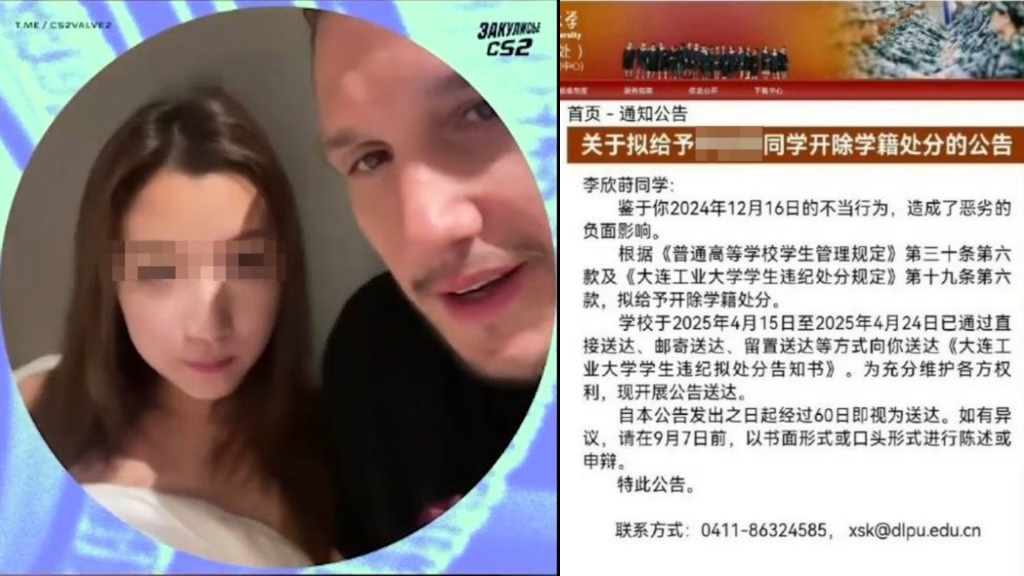Data Protection
Behind Closed Doors: Ukrainian Gamer’s Posts Lead to His Chinese Girlfriend’s University Expulsion

Table of Contents
The intersection of gaming, social media, and academic discipline has taken a troubling turn in China, where a female university student was expelled after her relationship with a professional gamer became public. This case raises critical questions about privacy rights, institutional authority, and the legal frameworks governing student conduct in a country known for its ironclad grip on protecting its image.
The Incident between the Ukrainian Gamer and his Chinese Girlfriend: When Private Lives Become Public Scandals
In December 2024, Dalian Polytechnic University in northeastern China expelled a female student for “damaging national dignity” after she was accused of “improper interactions” with a foreign man. Chinese internet sleuths have connected the accused Chinese student to videos posted by professional Ukrainian gamer Danylo Teslenko (@ZeusCSGO). The videos show him being intimate with the alleged in a hotel room. Teslenko confirmed on Sunday that he posted “a few videos on Telegram with a girl I met in Shanghai” but later deleted them “as soon as I understood the seriousness of the situation.”
Privacy Rights Under Chinese Law: A Legal Framework in Conflict
The case presents a stark conflict between university disciplinary authority and China’s evolving privacy protections. The Paper, a state-run newspaper in Shanghai, said it was not just “inappropriate” to publish the student’s full name but also “may even violate” Chinese law.
China’s Personal Information Protection Law (PIPL), effective November 1, 2021, establishes comprehensive data protection requirements. The law permits processing of personal information only under specific circumstances, such as when the processor has obtained the individual’s consent or when necessary to fulfill legal obligations.
The university’s public disclosure violates multiple PIPL provisions:
- Consent Requirements: Under the PIPL, individuals have the right to access, correct, delete, and object to the processing of their personal information.
- Purpose Limitation: Under the PIPL, processing of personal information must be reasonable and directly related.
The Legal Basis for University Discipline
China’s Education Law grants schools the authority to establish rules, with Article 43 requiring students to observe “conduct standards of the school.” However, this authority has limits.
Dalian Polytechnic University‘s vague concept of “damaging national dignity” as reasons for the student’s expulsion raises serious legal concerns:
- Proportionality: Chinese education law recognizes graduated disciplinary measures, from warnings to suspensions before expulsion.
- Gender Discrimination: Some on social media suggested that the university applies different standards based on gender.
International Legal Perspectives and Platform Responsibility
From an international human rights perspective, this case implicates privacy rights and freedom from discrimination under the International Covenant on Civil and Political Rights (ICCPR). The public disclosure of intimate relationships constitutes a severe privacy violation by international standards. It should be noted here that China has signed but not ratified the ICCPR.
The gaming industry’s involvement also raises unique issues about platform responsibility. Teslenko’s deletion of the videos highlights cross-border implications of content sharing. Esports organizations may need to consider enforcing its Codes of Conduct addressing players’ social media use, particularly regarding content that could harm others.
Comparative Analysis: U.S. Legal Framework
In the United States, such an expulsion would face significant legal challenges:
- Due Process: Public universities must provide procedural due process before expulsion.
- First Amendment: Consensual adult relationships receive constitutional protection.
- Title IX: Gender-based differential treatment could constitute illegal discrimination.
- FERPA: Would prohibit public disclosure of disciplinary records without consent.
These protections reflect fundamental differences in how the two legal systems balance institutional authority against individual rights—where Chinese law often prioritizes collective interests and social order, U.S. law emphasizes individual privacy and personal autonomy, making it nearly impossible for an American university to expel a student for a consensual relationship or publicly shame them for private conduct.
Policy Recommendations
This case highlights the need for legal reforms by Chinese lawmakers and regulators. Clarifying the relationship between institutional discipline and privacy rights would be a major first step. Establishing clear, objective standards for student conduct violations while also balancing that with proportional academic sanctions must be mandatory policy considerations.
For universities and educational institutions falling outside current Chinese law, establishing transparent disciplinary procedures that respect privacy rights and ensure gender-neutral application of conduct standards would bridge the gap.
And finally, the Gaming industry should seek to enact standards that protect third parties from content that violates privacy rights while also adopting mechanisms to prevent real-world harm.
Conclusion: Balancing Rights in the Digital Age
“It is improper to graft private affairs onto the public domain for public disposal,” said The Paper. This criticism encapsulates the fundamental tension between institutional Chinese authority and individual privacy rights, typically not seen in other gaming communities.
While U.S. and European data privacy laws such as the GDPR are largely grounded in fundamental rights and consumer privacy, some data privacy and cybersecurity lawyers have pointed out that China’s PIPL is more closely linked to national security interests. This case serves as a cautionary tale about the power of social media to transform private moments into public scandals with significant life-altering consequences, demanding that law and policy better protect individual privacy while fostering transparency with respect to human dignity and personal autonomy.







